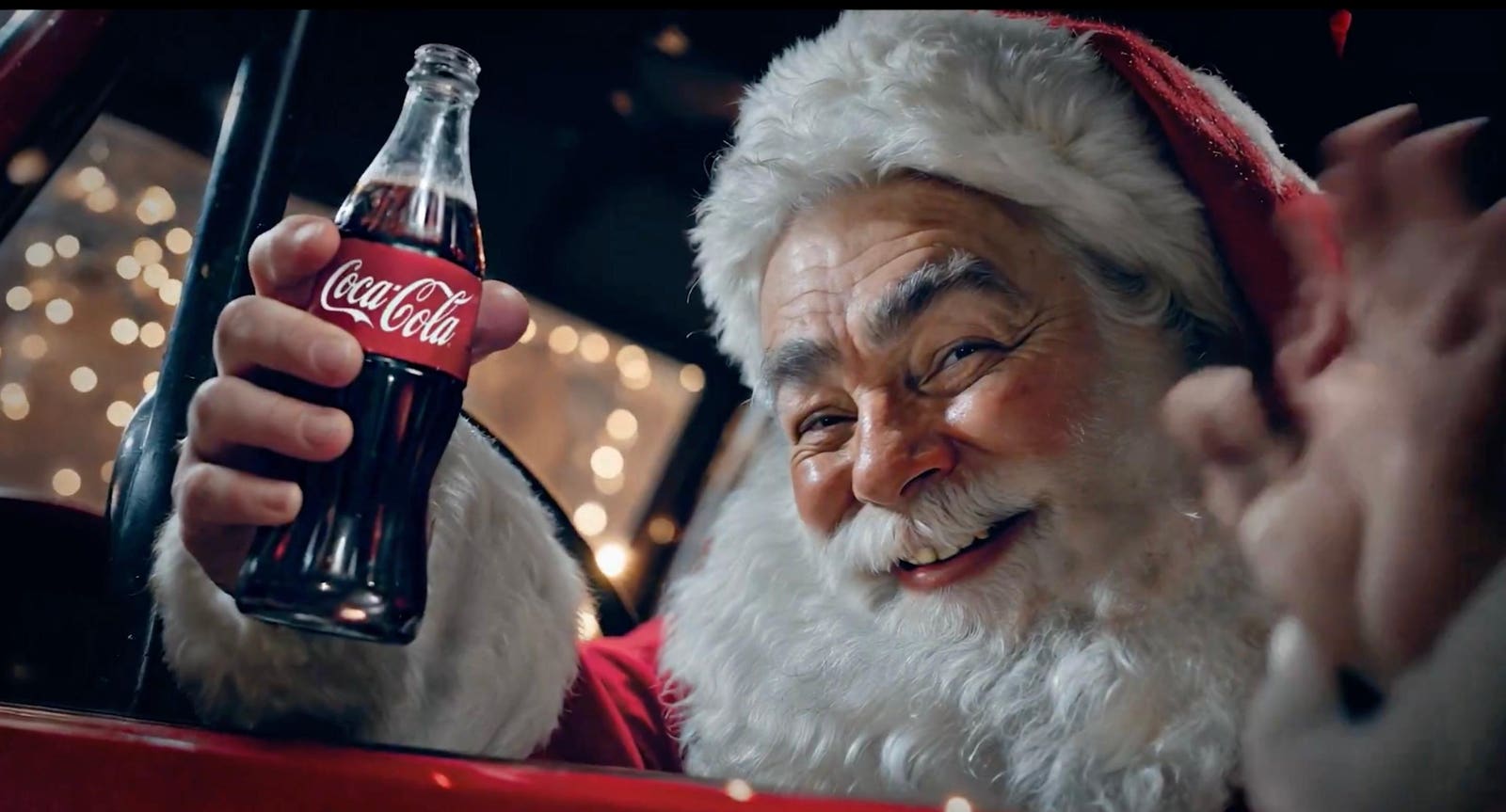An AI-generated image of Santa Claus from Coca-Cola’s controversial Christmas ad
Coca-Cola
Once again, Coca-Cola is embracing generative AI for Christmas, sparking online backlash and repeating the frenzy of bad publicity over the company’s use of AI last year.
The Backlash Against Coca-Cola’s AI-Generated Ad, Explained
In 2024, Coca-Cola’s three AI-generated Christmas ads were widely mocked as uncanny eyesores, with commentators asserting that the use of AI came across as cheap and tacky, in stark contrast to the wholesome Christmas ads that the soft drink company is known for.
Now, Coca-Cola has released two more AI-generated ads for Christmas 2025, this time featuring anthropomorphic animals gazing in rapt admiration at the arrival of red Coca-Cola trucks.
Again, social media users reacted with anger and disgust.
Some called for a boycott against all Coca-Cola products, and others suggested that they would be drinking Pepsi from now on.
A quote from Pratik Thakar, head of generative AI at Coca-Cola, invoked fury from commentators.
“The genie is out of the bottle,” Thakar told The Hollywood Reporter, “and you’re not going to put it back in.”
Much of the backlash seemed sparked by the perceived threat to workers employed in advertising, and beyond.
If the technological advancements promised by AI enthusiasts prove to be more than just breathless hype, then AI is predicted to disrupt the value of human labor across a wide range of industries—the embrace of AI in advertising is just the tip of the iceberg.
Workers in creative fields have been struggling to compete against AI-generated content, while mass layoffs in retail are already being attributed to the rise of AI.
The vast improvements made by video generation models can be seen in the new ads (this time, the truck wheels actually turn), but the visuals of both ads were criticized by commentators.
We’ve reached the stage where generative AI can be used to conjure realistic video, passing the threshold of the “Will Smith Eating Spaghetti Test,” but a touch of the uncanny valley still lingers.
Notably, Coca-Cola declined to comment on the cost of the new holiday campaign, according to The Wall Street Journal, which sparked suspicion from commentators who reckoned that the process wasn’t nearly as smooth as typing a few prompts.
Why Do Viewers Hate Coca-Cola’s AI Ads?
Several other companies have used AI in their ads at this point (Google released a fully AI-generated ad, too), but the online reaction wasn’t quite as forceful.
Coca-Cola seems to have become a battleground in the backlash against generative AI because the company’s Christmas ads are deeply nostalgic—Coke is credited with popularizing the modern, red-and-white design of Santa Claus.
In general, Coca-Cola ads are viewed as something of an American institution.
Indeed, the final scene of the critically acclaimed series Mad Men ends with the advertising genius Don Draper coming up with the famous “I’d like to buy the world a Coke” ad.
Now, the multi-billion dollar company is proudly releasing AI-generated content, like one of those “AI-slop” channels on YouTube Shorts.
It’s notable that Coca-Cola’s controversial AI ads are not even original—they are remakes of the immensely popular, hand-crafted ad from 1995, “Holidays Are Coming.”
All AI-generated media is inherently derivative, as the models are trained on countless works of artists and content creators, often without permission.
Filmmaker Adam Curtis famously described generative AI as “the ghost of our time,” as the models absorb the imagery, music and writing of previous generations and “mashes them up into this complex thing which then feeds itself back to us.”
He proposes that “AI is not the future. It’s the final end of the past.”
“It’s the moment at which the past came for us,” Curtis concludes. “And we will have to escape from it.”
MORE FROM FORBESForbesCoca Cola’s AI-Generated Ad Controversy, ExplainedBy Dani Di PlacidoForbesGoogle’s AI Passed The ‘Will Smith Eating Spaghetti’ TestBy Dani Di PlacidoForbesSam Altman Is Starting To See The Dead Internet TheoryBy Dani Di PlacidoForbesThe Backlash Against AI-Generated ‘Actress’ Tilly Norwood, ExplainedBy Dani Di Placido

